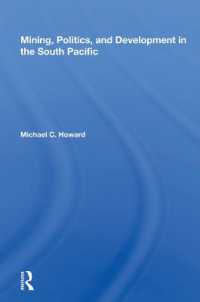- ホーム
- > 洋書
- > 英文書
- > Politics / International Relations
Full Description
The West feels lost. Brexit, Trump, the coronavirus: we hurtle from one crisis to another, lacking definition, terrified that our best days are behind us.
The central argument of this book is that we can only face the future with hope if we have a proper sense of tradition - political, social and religious. We ignore our past at our peril. The problem, argues Tim Stanley, is that the Western tradition is anti-tradition, that we have a habit of discarding old ways and old knowledge, leaving us uncertain how to act or, even, of who we really are.
In this wide-ranging book, we see how tradition can be both beautiful and useful, from the deserts of Australia to the court of nineteenth-century Japan. Some of the concepts defended here are highly controversial in the modern West: authority, nostalgia, rejection of self and the hunt for spiritual transcendence. We'll even meet a tribe who dress up their dead relatives and invite them to tea.
Stanley illustrates how apparently eccentric yet universal principles can nurture the individual from birth to death, plugging them into the wider community, and creating a bond between generations. He also demonstrates that tradition, far from being pretentious or rigid, survives through clever adaptation, that it can be surprisingly egalitarian.
The good news, he argues, is that it can also be rebuilt. It's been done before. The process is fraught with danger, but the ultimate prize of rediscovering tradition is self-knowledge and freedom.
Contents
Introduction
PART ONE
1 Defining Tradition
2 The West's War on Tradition
3 The Invention of Tradition
4 The Uses of Nostalgia
PART TWO
5 Hurrah for the Old
6 Tradition and Identity
7 Tradition and Order
8 Tradition and Freedom
9 Tradition and Equality
10 Tradition and Faith
Conclusion
Notes
Acknowledgements
Index






